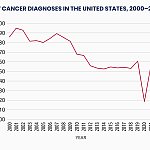
The bird flu outbreak continues to spread across the United States.
Over the last 30 days, the
Since the outbreak began in 2022, 145 million chickens, turkeys, and other birds have been slaughtered to keep the virus from spreading. It should be noted that there are nearly 380 million egg-laying chickens and more than 9 billion broiler chickens in the U.S.
Despite the spread of bird flu in animals, experts say the risk of humans contracting the illness remains low. Since March 2024, there have been
“There is no evidence to suggest that properly handled, stored, and cooked eggs can lead to avian influenza infections in people,” Timothy Brewer, MD, a professor of medicine and epidemiology at the University of California Los Angeles, told Healthline.
Nonetheless, the bird flu outbreak has raised concerns about the illness spreading to people. It also has sent the price of eggs skyrocketing, leading to a nationwide egg shortage.
The latest figures from December show that the average price for a dozen eggs in the United States has hit $4.15. That isn’t as high as the record price of $4.82 per dozen set two years ago, but it is still double the price from summer 2023. In addition, federal agricultural officials expect the cost of eggs to rise another 20% in 2025.
Part of the reason for the increase in price is that an infection of just a few birds forces poultry farmers to slaughter an entire flock to contain the outbreak. It can then take weeks for the carcasses to be removed and a new flock to be brought in, reducing the supply of eggs and driving up the price.
The avian flu has been detected in dairy cows in the past.
However, experts say pasteurized milk is safe to drink since the heated pasteurization process kills the bird flu virus. Some raw milk products, though, may pose a bird flu risk.
Raw pet food has also been linked to bird flu disease-related illness and death in cats.
However, bird flu has not been detected in chicken and beef products for human consumption. Still, experts recommend thoroughly cooking meat to kill any potential traces of the bird flu virus.
When it comes to eggs, Food and Drug Administration (FDA) officials
When purchasing and storing eggs, the FDA urges consumers to:
“In general, I recommend avoiding buying cracked eggs or eggs past their expiration date,” said Brewer. “I am not aware of any data to suggest that organic eggs are safer than non-organic eggs. The same biosafety regulations apply to both.”
William Schaffner, MD, a professor of preventive medicine and health policy at Vanderbilt University in Tennessee, agreed.
“The public can buy eggs with confidence. Eggs have a strong safety record. Eggs, whether white, brown, organic, or pasteurized, all are safe,” he told Healthline.
When cooking eggs, FDA officials recommend:
“Pasteurized eggs have a lower risk of infection because pasteurization is effective in killing viruses including avian influenza and bacteria,” Brewer noted.
“Persons concerned about food safety should consider using pasteurized eggs when eating raw or undercooked eggs. There is no infectious risk difference between pasteurized and non-pasteurized eggs when eggs are properly cooked.”
If you suspect that you or another person has contracted a foodborne illness, contact a healthcare professional immediately.
The bird flu outbreak continues to spread in the U.S., affecting more than 100 flocks in 18 states over the past 30 days. However, the risk of a person contracting the illness is low.
Federal officials recommend that consumers purchase only refrigerated eggs. They add that eggs should be immediately refrigerated once they are brought home.
Pasteurized eggs have a lower risk of infection since the process effectively kills viruses and bacteria, but thoroughly cooking unpasteurized eggs is also considered safe.
They add that eggs should be cooked until the yolk and white are firm, and scrambled eggs should be cooked until they are fluffy and not runny.





